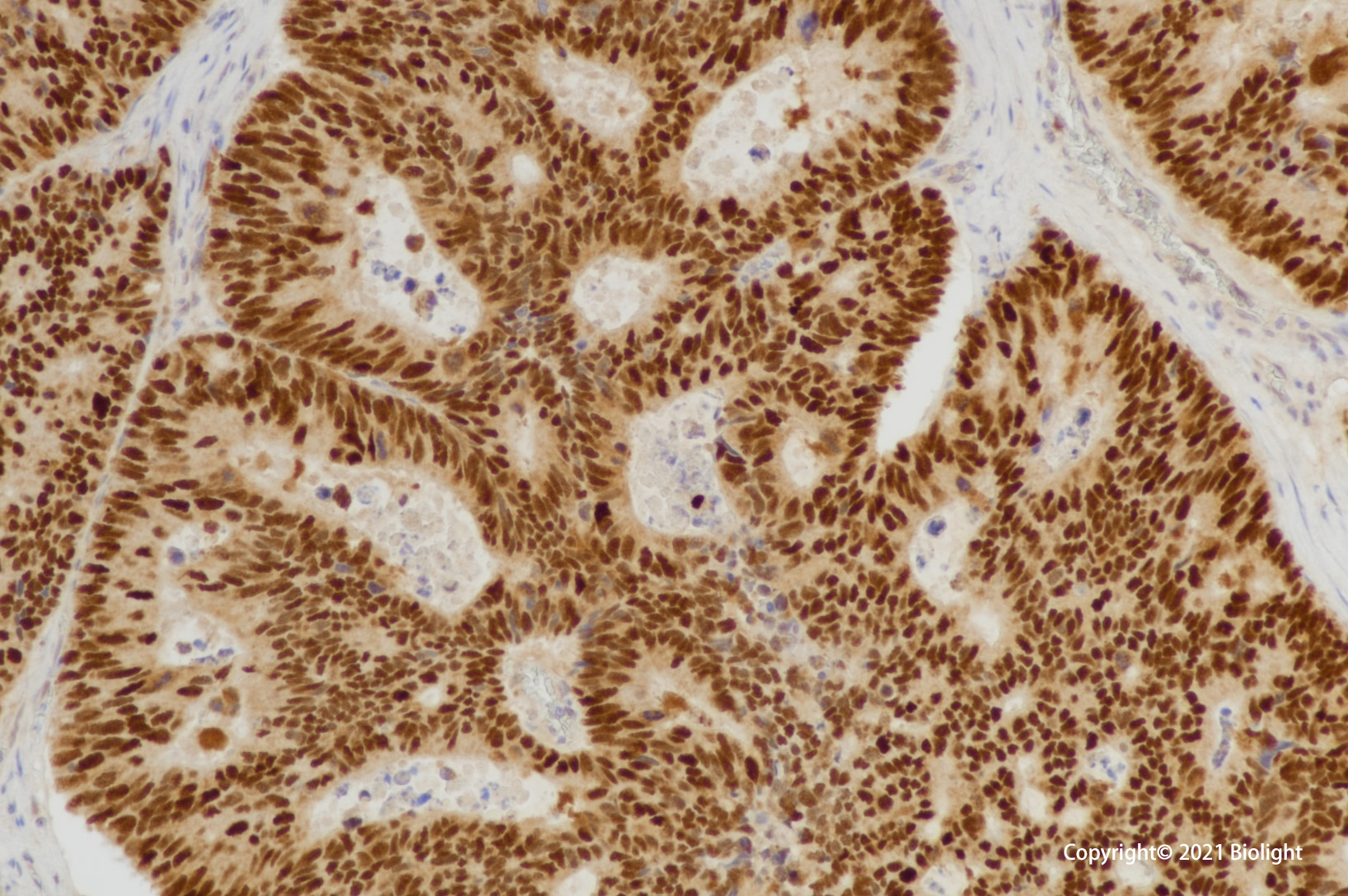
Anti-TP53 Antibody, Rabbit Polyclonal
產(chǎn)品編號(hào):PA00116HuA10
$ 待定
規(guī)格 50uL 100uL 200uL
|
產(chǎn)品名稱(chēng):Anti-TP53 Antibody, Rabbit Polyclonal
經(jīng)驗(yàn)證的應(yīng)用:WB/IHC
交叉反應(yīng):/
特異性:human TP53
免疫原:Recombinant human TP53 protein, fragment Met1~Asp393; UniprotKB: P04637
制備方法:Produced in rabbits immunized with human TP53, and purified by antigen affinity chromatography.
來(lái)源:Polyclonal Rabbit IgG
純化:Immunogen affinity purified
緩沖液:Supplied in PBS, 50% glycerol and less than 0.02% sodium azide, PH7.4
偶聯(lián)物:Unconjugated
狀態(tài):Liquid
運(yùn)輸方式:This antibody is shipped as liquid solution at ambient temperature. Upon receipt, store it immediately at the temperature recommended.
儲(chǔ)存條件:This antibody can be stored at 2℃-8℃ for one month without detectable loss of activity. Antibody products are stable for twelve months from date of receipt when stored at -20℃ to -80℃. Preservative-Free. Avoid repeated freeze-thaw cycles.
圖片:
Figure 1. Application in WB
Western blot analysis of extracts of MCF7 cell line, using TP53 antibody (PA00116HuA10) at 1μg/mL. Secondary antibody: HRP Goat Anti-Rabbit IgG (H+L) at 1:10000 dilution. Blocking buffer: 5% nonfat dry milk in TBST. Detection: ECL Basic Kit. Exposure time: 1 s.
Figure 2. Application in IHC
Immunohistochemistry (Formalin/PFA-fixed paraffin-embedded sections) analysis of human colon sections labelling TP53 with purified PA00116HuA10 at 10μg/mL. Heat mediated antigen retrieval was performed using citrate buffer (pH 6.0). Tissue was counterstained with Hematoxylin. Rabbit specific IHC polymer detection kit HRP/DAB secondary antibody was used at 1/4000 dilution. PBS instead of the primary antibody was used as the negative control.
別稱(chēng):TP53, LFS1, TRP53, Li-Fraumeni Syndrome, Cellular tumor antigen p53, Antigen NY-CO-13, Phosphoprotein p53, Tumor suppressor p53
背景信息:p53 is well known for its key role as a tumor suppressor protein. It is 393 amino acids (aa) in length with a predicted molecular weight of 44 kDa. It belongs to the p53 family that also includes p63 and p73. Structurally, p53 is characterized by an N-terminal transactivation domain, central DNA-binding and oligomerization domains, and a C-terminal regulatory domain. It is thought to exist as a homotetramer, and it exhibits approximately 72% and 76% aa identity with its mouse and rat orthologs, respectively. Mutations in the p53 gene are one of the most frequent genomic events accompanying oncogenic transformation. p53 responds to signals such as DNA damage or cell stress primarily through its actions as a transcription factor. Among its gene targets are a range factors that promote DNA repair mechanisms or apoptosis including cell cycle regulatory proteins and members the Bcl-2 family. Because of its critical role in genomic homeostasis, p53 activities are tightly regulated by a network of protein-protein interactions, microRNAs, and a range of post-translational modifications, including phosphorylation, acetylation, methylation, and ubiquitination. A widely studied regulator is Murine Double Minute 2 (MDM2). MDM2 is known to suppress p53 activity through direct binding or through its actions as a Ubiquitin ligase (E3) that catalyzes p53 ubiquitination and proteasome-mediated degradation.
全稱(chēng):Cellular tumor antigen p53 (TP53)



